Graham Reid | | 4 min read
Seude: The Asphalt World
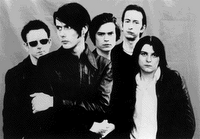
At the going down of the sun we will
remember them, those great Britpop bands who were The Next Big Thing
– like Longpigs, the Seahorses, Mansun, the Supernaturals . . .
All household names, right?
Yes, it was – and still is -- easy to
be cynical about Nineties Britpop, especially from this distance when
Oasis and Blur were being set off against each other, and British
music magazines would artificially manufacture controversy and give
cover stories to bands barely out of the practice room.
From the other side of the world we
only accepted the music if it stood up outside of the swaggering
interviews (Richard Ashcroft of the Verve), brawling (Liam Gallagher)
and alcohol-fueled gigs.
To be fair though, the long-forgotten
Shed Seven were thrilling on the night, Elastica were briefly very
promising, and the most cruelly ignored in this country was Ocean
Colour Scene (who enjoyed the nod from the Modfather Paul Weller) who
delivered a couple of thrilling albums at their peak and played one
of the most memorable shows I've ever seen. And a sad but memorable interview too.
Much of Britpop was retro (Blur looking
back to Barrett-era Pink Floyd then the Kinks, Oasis rejigging the
Beatles) and one of the most interesting bands was Suede whose
frontman Brett Anderson shared a cover story encounter with his role
model David Bowie (they haven't spoken since apparently) and was the
previous partner of Elastica's Justine Frishmann who co-founded Suede
but split early and moved on to Damon Albarn of Blur. Yes, the
Britpop world was that small.
Even before their first major label
single, Suede were hailed in 92 by a Melody Maker cover story
as “the best new band in Britain” – which is quite something to
have to live up to. But – unlike say the Verve – they did.
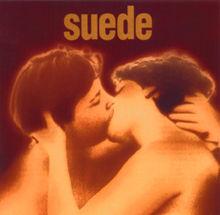 Their self-titled debut album the
following year – in a cover with figures of indeterminate gender
kissing – had a confidently sexual swagger and for many announced
the arrival of Britpop. It was a curious album -- a large dollop of
glam/bi-sexual Bowie but also poppy, dark and electrifying at a time
when cocky indifference ruled. It opens with the evocative and
“because we're young . . . let's chase the dragon”, delivered
hits singles (The Drowners, Metal Mickey) and dealt with
incest/rape, downers and nervous breakdowns. Even now it is quite
something.
Their self-titled debut album the
following year – in a cover with figures of indeterminate gender
kissing – had a confidently sexual swagger and for many announced
the arrival of Britpop. It was a curious album -- a large dollop of
glam/bi-sexual Bowie but also poppy, dark and electrifying at a time
when cocky indifference ruled. It opens with the evocative and
“because we're young . . . let's chase the dragon”, delivered
hits singles (The Drowners, Metal Mickey) and dealt with
incest/rape, downers and nervous breakdowns. Even now it is quite
something.
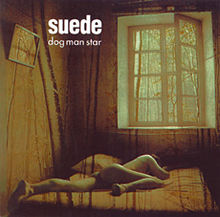 The band however was dogged with
problems, notably the sparks between Anderson and guitarist Bernard
Butler who quit during the recording of their second album Dog Man
Star which also came in a sexually charged cover and was written
by a reclusive Anderson while he was heavily into mind altering
drugs. The album – experimental, dense, apocalyptic, poetic, camp,
dramatic and highly melodic – came embellished by synths, phasing
and orchestration, which was deliberate move to by Anderson to
separate them from the Britpop of Pulp, Blur and Oasis.
The band however was dogged with
problems, notably the sparks between Anderson and guitarist Bernard
Butler who quit during the recording of their second album Dog Man
Star which also came in a sexually charged cover and was written
by a reclusive Anderson while he was heavily into mind altering
drugs. The album – experimental, dense, apocalyptic, poetic, camp,
dramatic and highly melodic – came embellished by synths, phasing
and orchestration, which was deliberate move to by Anderson to
separate them from the Britpop of Pulp, Blur and Oasis.
It is
undeniably their creative peak, although it wasn't as commercially
successful as their debut.
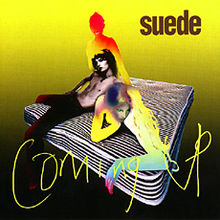 Although Dog Man Star was a
highpoint it wasn't exactly all downhill from there: Coming Up
(1996) was a seismic shift from dense art music to more pure pop,
glam rock and upbeat – and they were rewarded with big sales,
critical approval and their second Mercury Prize nomination (they won
the award with their debut album).
Although Dog Man Star was a
highpoint it wasn't exactly all downhill from there: Coming Up
(1996) was a seismic shift from dense art music to more pure pop,
glam rock and upbeat – and they were rewarded with big sales,
critical approval and their second Mercury Prize nomination (they won
the award with their debut album).
Head Music (99) and A New
Morning (2002) divided critics and by the latter ( a quieter and more introspective album) their momentum
had faltered because of Anderson's drug issues and keyboard player
Neil Codling quitting. Aside from the excellent, career-closing
Singles collection (03) that was it from one of Britain's most
interesting bands of the Britpop era. Until of the inevitable reunion
two years ago (with Butler, against the odds) – and more
importantly the reissue of all these albums and Singles.
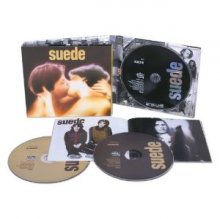 Each remastered original album comes
with an extra disc of B sides, live material and rarities, plus a DVD
(videos, live shows etc) They are impressive packages, or you can
just sample with the double Best Of.
Each remastered original album comes
with an extra disc of B sides, live material and rarities, plus a DVD
(videos, live shows etc) They are impressive packages, or you can
just sample with the double Best Of.
A listen back to Suede in the absence
of the cover stories and hype is instructive: they were one of the
best bands in Britain on the evidence of their first three albums and
that singles collection.
They left the Longpigs, Seahorses and all the others well behind. (Still, Longpigs gave us the great Richard Hawley – but that's another story.)
When it came to Suede, Melody Maker got it right.

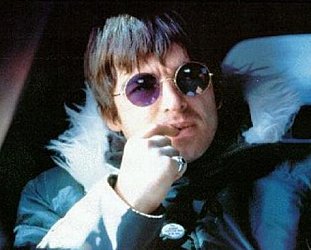
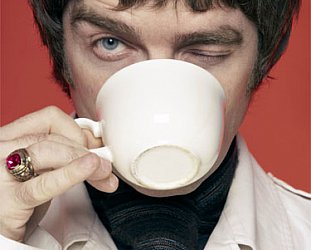


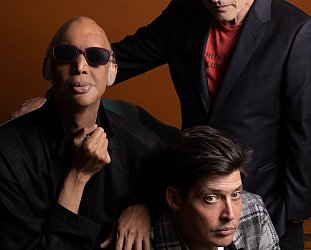

The Riverboat Captain - Jul 4, 2011
Thrilling stuff. On a recent foray to the record shops to check out and buy new music, I came away instead with the first two deluxe Suede reissues, well satisfied with my shopping.
SaveAnthony - Jul 5, 2011
Suedes debut was a great album, some say this ignited the resurgence of guitar led music in the mid 1990's and I would have to agree...fair call on the Seahorses though, they had the mighty John Squire but sadly not enough good songs and I have to disagree about the Verve, those first two albums are classics! Interestingly enough, Bernard Butler tried out for The Verve when Nick McCabe left in 1995 but it didnt work out and McCabe rejoined in1996.
Savedavid geary - Jul 9, 2011
Yes, well worth a re-look. They deserve their place in the pop pantheon for the single Trash alone. Jarvis was funnier, Liam has a better sneer, Damon had it all, but Suede had their own good thing going on... but the drugs don't work...
Savepost a comment